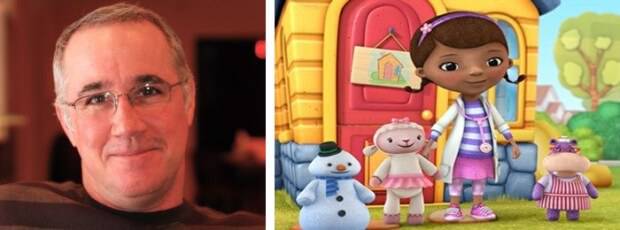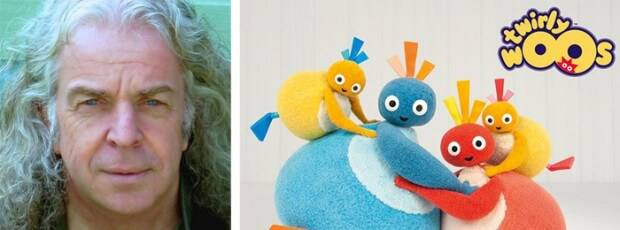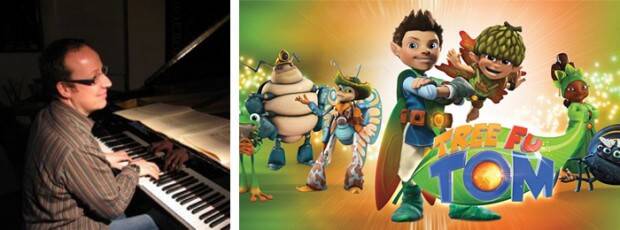How To Get Great Music In Your Animated Show
Just how do you get that brilliant musical magic that not only drives the story but sticks in your mind for ever. It’s all about the producer’s relationship with the composer. And the starting point is being able to get your ideas across and mould the musical mix as you go along – taking and giving as the show develops.
It’s such an important element to get right we thought it would be good to ask three of the very best animation composers how they like to work with producers and directors. Their words of wisdom are fascinating as all three have created the musical landscapes for some of the biggest kids TV shows around:
- Stuart Kollmorgen, based in the US who writes the music for Disney’s smash hit Doc McStuffins, Peter Rabbit, Gaspard & Lisa, Imagination Movers and many other favourites.
- Andrew McCrorie-Shand, composer behind the legendary Teletubbies, Abney & Teal, Rosie & Jim, Tots TV and now Ragdoll’s latest series, Twirlywoos.
- Michael Richard Plowman, writer of such global favourites as Tree Fu Tom, Sonic Boom, George of the Jungle, 1001 Nights and A Christmas Carol.
Sit back and enjoy their pearls of wisdom…
Stuart Kollmorgen
Stuart, how do you prefer to be briefed before you start a project?
I always ask to see the full bible because I’m usually coming in quite late to the process unlike the producer and director who’ll know the story, the characters backwards. To write the music you need to really understand as much as you can about the project to get into the flow. The bible is a good way of getting up to speed very quickly.
It’s always good to be given references to other shows – for example “it’s like Scoobydoo but edgier”! That tells me a lot right away. But if you do mention a show do tell me what it is you like about it.
Musical references are important too but you have to be careful as often a pop song will be cited and songs are completely different to incidental music – their emotional tone is very driven by lyrics which you obviously don’t have with underscore. The musical reference should be there to indicate the tone or the texture needed in the music. And of course citing a current pop song can be useless because by the time your project is done that song will be old news.
Another thing producers have to understand is what the music actually is there for. It mustn’t be bland wallpaper covering the bits without dialogue or too heavy-handed squashing story points and missing the subtle changes in emotional direction. The incidental music should move the story along without being too noticeable. As a composer, especially in children’s shows, I feel like I’m standing behind the youngsters, helping them to understand the emotion of a scene – nudging them along, providing clues to how they should be feeling.
How useful are spotting sessions?
Spotting sessions with a producer/director are great – when you can look at the animation and go though it scene by scene. For example I am doing a second spotting session today via Skype. This is the second episode, prior to delivery on the first, and we are discussing conventions that will exist series-wide, and the placement of the music. I’m now getting a really good feel for what the show runners want as far as density of scoring overall: where they like me to stand back and let the dialog drive, how out-front they want the music, how hard to hit the comedy etc. I scored a couple of scenes for them so they have a sense of what I’m going to try and do on this series. A picture is worth a thousand words, so this has informed them, and their reaction, tells me what direction the music will be taking.
And Animatics?
Actually writing to an animatic is actually NOT very helpful. Basically they’re storyboards. The timing of the scenes will be all wrong and there’s not enough action so the composer will end up getting it wrong. I usually only get them for pitching, or if there is a scene where the timing will be critical. For instance a song or a rap or a chant or a march where the music and action needs to stay in time. I can’t tell you how many times I’ve received a finished animation where a character is singing and it was recorded wild without reference to any tempo and I’m expected to put music behind it. If the animation is done you are sunk if it is seriously out of time, and most people can’t tell just by listening to the solo voice. Either the music will be drunkenly out of time, unacceptable to our ears, or the lip flap will be off, – equally unacceptable, and unfixable short of reanimating.
I’ve spoken to Holly Gregory about this ( voice director for Dora the Explorer) and she told me, yes these singing chanting rapping moments are sometimes scripted, but often come up improvisationally in the voice record. She encourages it, but is also armed with a click track and a pitch pipe, for pitch and time. I beg the producers when there’s something that needs to be in time, like a march, to animate it against music. Any music! It’ll stay in time that way.
How much guidance/notes do you like getting as you go along?
Early on as much as possible, because in series work, your producer will probably be too busy once the show is on track.
Once I get past the first two or three episodes you need far less direction from the producer. By then the tone should be set and anyway you’re usually rushing so fast there’s no time. Notes are very useful but too many can be very difficult to handle. I’ve had situations where I’ve been given 56 notes for one 11 minute episode. Too much micromanaging without regard for the overall musical flow will create musical chop suey. In that particular case the episode stunk to high heaven and the producer was grasping at the last straw to fix it – which was me! The composer is the last writer on the show, and music can help cover shortcomings in the action, create the illusion of drama to a degree, but it can’t change awful into good. One producer uses the phrase “bolster”, e.g.” bolster the hit when the dog runs into the fence”. You can bolster but you cannot create.
The worst notes are those that say “I don’t like this. I want something else” but don’t give you any idea. Notes should be about the story telling “this is what I want to happen next with the story, at this point we want the characters too feel this….this is the emotion we need etc.” The director is in a key position as they know the story, they know what’s happening and so of course they’re going to spot things that aren’t working.
What advice would you give producers?
The problem that producers have is that talking about music is actually very difficult. You can steer actors, the designers, the writers relatively easily but getting across what music you’re looking for is difficult because there’s no real language for it. Therefore the best way I believe is for creatives to talk about the emotions they want. And if there is a problem with a scene, tell me clearly what you didn’t achieve with the action or storyline and I’ll attempt to “bolster” it.
Oh yes, and if I’ve written something you really, really like go ahead and let me know! My ego needs it, and I will try to repeat the “goodness”. You know revisions can be crushing drudgery so sprinkling a little sunshine on your creatives will yield positive results.
Andrew McCrorie-Shand
Andrew, What do you need from the producer or director to get you started on a project?
In an ideal world l like to work to a version of the show/film that contains as much finished and approved material as possible. This means a locked picture edit, full FX, actual & ADR dialogue along with any narration. That’s the ideal of course , but all too often the reality is that many of the post-production elements are being created at the same time which means that as a composer l can’t get the full benefit of the rhythm of the dialogue and FX. Also in the absence of FX there’s sometimes the urge to try to tell more of the story musically than is actually needed. I am not a big fan of the wall-to-wall music approach and believe the story is often better served by thoughtful music placement, in which l am aided by knowledge of FX, dialogue etc.
How much ongoing guidance do you like?
The more the merrier actually! Any little thing that helps me create the right textures and sound palette is good. I’ve worked with temp tracks ranging from Mozart to Green Day and Brian Eno to scratchy snippets of ads hastily recorded on a mobile phone from the TV. If it helps the producer or director articulate their musical needs then bring it on.
Some producers/directors find it hard to put across their feelings in a technical way but can demonstrate the emotional requirement with pictures or pieces of music or bits of films or TV shows. It all helps to build up a better understanding of where they want the music to go. Of course it’s not always like that and at the other extreme are the helpful instructions handed out by a particularly hard-pressed director – “It’s 10pm. Do what the **** you want, just make sure you have it here tomorrow at 8am”. NOT so helpful.
Does getting the composer involved earlier on help?
Yes, If l am lucky enough to be involved in the project from it’s earliest stages then l will have a deeper understanding of the way it has developed in terms of script and characters. Coming in later on in the process it becomes a much steeper learning curve. And of course there’s always the last-minute project where there isn’t even time to think.
l do enjoy the back and forth of producer/director notes – picking up on things that l thought worked really well, but not picking up on things that l would have put good money on being chucked out at the next round. A wonderful mystery! In Teletubbies the first complete episode was titled ‘Ned’s Bicycle’, and we must have remade that one ten times over before it was right. The other 364 episodes were a piece of cake after that.
Once the music is synched to picture l welcome notes/comments/general feedback – anything that means l can get closer to the ideal music for the project whilst hitting all the production briefing points. Sometimes it works like a dream, other times it needs a bit of coaxing, and once or twice it’s a complete nightmare. Bit like life really.
And would there be any advice to give to a first time (or relatively inexperienced) director/producer in making it work with the composer?
It’s not so much advice but an observation. The great thing is that we all listen to music, have a massive list of favourite songs and pieces of music stretching back to when our age was measured in single figures. Music plays a bigger part in peoples lives than almost at any other time in history. And everyone has an opinion on how well a particular piece of music works with a particular scene. It’s all down to hearing it with the pictures. When audio and vision click it’s verging on magic – my job is to make that happen every time. And l love making it happen.
Michael Richard Plowman
Michael, what do you need from the producer or Director to get you started on a project?
You know apart from the bible and all the other available materials the very best thing a producer can give me is his or her time. I really like to get to know a producer personally and find out what the project means to them. For the way I like to work I find this the very best way of finding out what the project really means to them – and that is the key. Let’s face it this is the producer’s baby and has often been worked on for years and I need to know how they want that child to grow up! Being completely in tune with what the show means to them is the best way to start. And although that might seem simplistic you’d be surprised how often the composer and the director are actually working on two different shows in their heads because they haven’t connected.
It’s also important to understand of course what the producer likes and doesn’t like musically. So, while the bible, scripts and environments are wonderful for understanding the components of a show, understanding the producers musical approach is crucial. Believe me it saves me going down paths that may hinder the project or even write myself out of the job.
Being given musical references is also very important – as many as they need. For me this process can be a real eye-opener and creatively very stimulating. There has been many times where I am introduced to a style that I am unfamiliar with. It can be a breath of fresh air, the perfect antedote to the overused music that everyone is using simply because it’s flavour of the month.
Of course there’s always the danger that the client wants the music to be exactly like the reference they’ve given. But then, that’s my job to take the reference and balance that with what I think is musically needed to support to the project.
What level of guidance do you like thoughout the project?
Regular guidance and direction throughout the process is essential in getting to a place where we are both happy with the music. To be at this point means that not only are we in agreement about where the music fits technically with the picture but more importantly how it is meant to make the viewer feel emotionally at all those various points.
When I start any project I like to write handfuls of sketches. Short and long. Trying different melodies and instruments. For example on Tree Fu Tom I think I wrote 50 test pieces before writing a single note to picture. Whether I use these or not this process really helps get a relationship with the team and also what I call “getting all the bad ideas out”. I do believe small amounts of music with small amounts of feedback help the bigger picture once you start what can be a very long train ride.
Are spotting sessions invaluable?
Well, spotting sessions can be very useful in moderation. Sometime a great conversation about the overall musical ideas for the project can be much more beneficial though. On a movie I like to have a spotting session, but on a television series there never seems to be enough time to sit down. When The train starts on a 52 episode run sometimes you only check the tickets once, not at every station! Normally the notes on an episode will help you develop the sound of the show and become a somewhat spotting session for the next episode and so on.
Regarding notes. I really don’t care how many notes a client gives, especially when they are helping the project. At some point of course you run out of time. It is my job as a composer to help guide the client so that giving notes are never stressful for them and he or she feels like I am listening to them. Never say no to a client, there are always better more constructive ways to disagree.
What advice can you give to producers to get the best results?
It’s simple really: “Get to know me”. I want to really enjoy the project. This can be a very long process that takes the team on an emotional roller coaster and can last years. So “get to know me” is really important. Why? Because when things get tense the relationship and trust hold it together. When things are great the relationship celebrates together. So “Get to know me” ! I want to get to know them and them to find out what sort of guy I am. I want to have a personal relationship with them. This way you get a high degree of trust. In fact the founding basis of my business is that clients, producers, directors know they can trust me.
In my book a good composer has to have two skill sets – one the ability to create great music but just as important is the ability to relate to the producers and help interpret their ideas onto screen with as little stress as possible.




